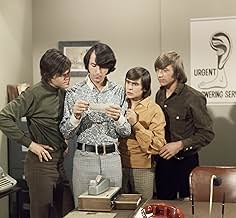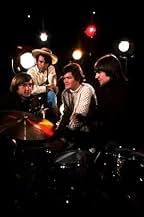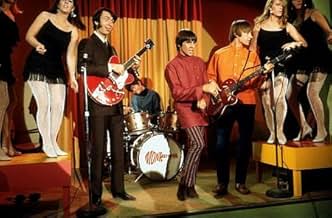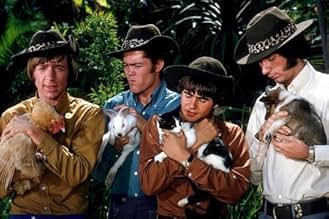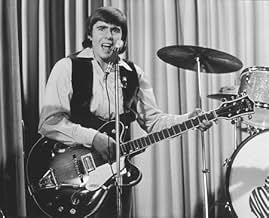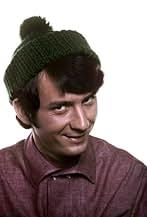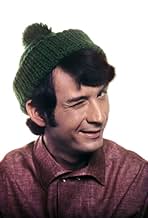Ajouter une intrigue dans votre langueThe misadventures of a struggling rock group.The misadventures of a struggling rock group.The misadventures of a struggling rock group.
- Récompensé par 2 Primetime Emmys
- 3 victoires et 2 nominations au total
Parcourir les épisodes
Avis à la une
No-one has ever tried to pretend that 'The Monkees' were anything more than a pop group specifically created for a television show, and to sell bubblegum music to kids. That said, it should also be noted how talented Mike Nesmith, Peter Tork, David Jones, and Micky Dolenz were as comedy performers, far more so than the members of 'Herman's Hermits' and 'The Dave Clark Five', both of whom tried and failed to reach the same audience. The show took its cue from the Beatles' movie 'Help!', with the band constantly running across rooftops, chased by screaming girls, and famous actors hamming it up for all it was worth in cameo roles. John Lennon likened The Monkees to the Marx Brothers, and its not hard to see why. The show caught the mood of the time; it was colourful, daft fun, just what the world needed as the Vietnam war raged. And the songs were good too, particularly 'Last Train To Clarksville'. Such was the show's popularity in Britain that it was being rerun long after the group disbanded.
This is definitely one of the most influential shows in television history. The show was so funny and at times surreal but you could see that the boys had a lot of fun doing the shows even if they didn't like a lot of the music they were forced to do in the early shows. Speaking of the songs, this show was also a great showcase for many of the greatest songwriting talents of the 60's including Goffin and King, Neil Diamond, Boyce and Hart, John Stewart and Harry Nillson.
The Monkees may have been created as a Beatles-of-America series, but like The Fab Four the show and the group within had a pivotal role in pop music history. While the concept of quick-edit rock music pieces began with A Hard Days Night and its sequels, it was The Monkees that really fleshed out the concept that today is known as the music video.
The power of television proved itself with Monkee-mania, and seeing the series and listening to the records four decades after their debut reveals how fresh and engaging both still are. The sit-com concept was basically parodied, and the free-wheeling styles of Micky Dolenz, Michael Nesmith, Peter Tork, and David Jones made the parodies all the more cutting and funny. There is a magnetism to Micky, Mike, Peter, and Davy that still shows in the show and the music; the use of session hipsters in the backing tracks certainly created a strong baseline at the beginning, but in concert with session help or all on their own (in the album Headquarters and the songs from which the show made use), it was Micky, Mike, Peter, and Davy who gave the music a stamp that was undeniably theirs.
The same is true of the show - other singers have shown engaging humor (Alison Krauss is one of the funniest), but none show the magnetic zaniness of The Monkees (if anything, Ms. Krauss' sense of humor is more like Mike Nesmith's than anything).
This is why the show and the group will always endure.
The power of television proved itself with Monkee-mania, and seeing the series and listening to the records four decades after their debut reveals how fresh and engaging both still are. The sit-com concept was basically parodied, and the free-wheeling styles of Micky Dolenz, Michael Nesmith, Peter Tork, and David Jones made the parodies all the more cutting and funny. There is a magnetism to Micky, Mike, Peter, and Davy that still shows in the show and the music; the use of session hipsters in the backing tracks certainly created a strong baseline at the beginning, but in concert with session help or all on their own (in the album Headquarters and the songs from which the show made use), it was Micky, Mike, Peter, and Davy who gave the music a stamp that was undeniably theirs.
The same is true of the show - other singers have shown engaging humor (Alison Krauss is one of the funniest), but none show the magnetic zaniness of The Monkees (if anything, Ms. Krauss' sense of humor is more like Mike Nesmith's than anything).
This is why the show and the group will always endure.
Every now and then, on TV, they repeat The Monkees, and when they do, you know you're in for half an hour of lunacy.
I've been to a few staff parties at the places I've worked over the years, and when "Here we come..." blasts out, the dance floor's always packed in seconds.
LONG LIVE THE MONKEES!
I've been to a few staff parties at the places I've worked over the years, and when "Here we come..." blasts out, the dance floor's always packed in seconds.
LONG LIVE THE MONKEES!
I was 9 or 10 years old when The Monkees debuted on NBC. I have been a fan ever since. I even saw them in concert during the summer of 1967. I was very peeved at not being able to hear them due to the screaming girls. I thought girls must be the dumbest creatures on earth, but of course I changed my feelings before long. They were still dumb as far as I could tell, but they were cute, too. I saw the Monkees again when three of them (minus Nesmith) reunited in the mid-eighties and late nineties. The Monkees have been unfairly ostracized for decades. "They don't play their own instruments", their critics complained. They were not allowed to play on their first two albums. Don Kirshner, their egomaniacal producer, wanted total control. This ultimately got him fired by the band. He released More of The Monkees without permission from the band. If that weren't bad enough, the album's liner notes were pure Kirshner. Kirshner's egomania is all too apparent. He shamelessly name drops and barely mentions The Monkees at all. Michael Nesmith put his fist through a wall when the band met with Kirshner later. According to Micky Dolenz, Nez snarled, "That coulda been your face, motherf-----!" In any event, that was it for Kirshner as far as The Monkees were concerned. They finally had creative control of the music. For their third album, The Monkees Headquarters, they played on every song with minimal outside accompaniment. They credited the extra 2 or 3 musicians in the liner notes, something other bands (Beatles included) were not so forthcoming about. Micky Dolenz has never gotten the credit he deserves as a great rock vocalist. Just listen to No Time, Randy Scouse Git, Going' Down, Words, Pleasant Valley Sunday, etc. Each Monkey had talent. Micky had a great voice, Mike Nesmith was a good singer and musician, Peter Tork played about a dozen instruments, and Davy Jones was a superb showman and a pretty good singer. About 20 years ago, there was talk of a Monkees TV special. Davy was explaining how it would be set up. "Mike would produce, Micky would direct, and Peter would be in charge of the music." "But what would you do?" Davy was asked. "I would be the star, of course, and get all the girls!" When I see some of the acts who have been inducted into the Rock and Roll Hall of Fame (the Sex Pistols?!) there is no doubt The Monkees deserve to be enshrined. They certainly are more deserving than many who are already in.
Le saviez-vous
- AnecdotesWhen the TV series was about to be renewed for a third season, The Monkees wanted to change it from a half-hour sitcom to an hour-long variety show where they would introduce new artists; however, NBC gave the group an ultimatum: stick with the format as it was or be canceled. They stuck to their guns and, as a result, the TV series was canceled after two seasons.
- GaffesIn a number of episodes from season 2 of this TV series, Micky Dolenz's hair changes back and forth from a straight look to a curly "permed" look. This was due to the fact that these episodes were filmed at two different times: first in the spring of 1967 (during which time a number of the actual episodes' story lines were filmed) and then later that autumn (during which time all of the episodes' song performances were filmed). During the summer break, Dolenz let his hair grow out. The difference is perhaps most noticeable in the episode A Nice Place to Visit (1967) where, at one moment, Dolenz is performing a song with his hair curly and then, in another moment, is seen leaving the stage with his hair straight.
- Crédits fousThe Christmas Show (1967) departs from the usual stills montage by ending with The Monkees giving the TV audience a Christmas wish of peace. The group then brings the crew members onto the set and gives them all a very happy and raucous opportunity to give their loved ones at home a Christmas greeting, all while the closing credits play over this.
- Versions alternativesSeveral episodes of this TV series, either when shown in network reruns (i.e., the CBS run) or in syndication, had newer songs replacing older ones on their soundtracks.
- ConnexionsFeatured in TV Guide: 40th Anniversary Special (1993)
- Bandes originales(Theme from) The Monkees
(uncredited)
Written by Tommy Boyce & Bobby Hart
Performed by The Monkees
Produced by Tommy Boyce, Bobby Hart & Jack Keller
[title theme]
Meilleurs choix
Connectez-vous pour évaluer et suivre la liste de favoris afin de recevoir des recommandations personnalisées
- How many seasons does The Monkees have?Alimenté par Alexa
Détails
- Durée30 minutes
- Mixage
- Rapport de forme
- 1.33 : 1
Contribuer à cette page
Suggérer une modification ou ajouter du contenu manquant



